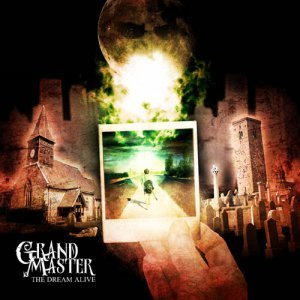You might have noticed that I have a routine of genre-tagging bands right in the first paragraph of a review I’m writing, in case my readers aren’t bored enough to go through 300 words describing an album which is not of interest to them. Well, this time you’ll just have to read the review, because this stuff is hard to pigeonhole.
Prominent bass, prominent drums (I quit counting around the sixth drum solo), a guitar player channeling every (positive) cliché in metal guitar, from riffs and guitarmonies laden with Maiden-worship to classic shredding, short appearances of synths/piano and a singer with a gentle, melodious approach take you on a journey through heavy, prog, thrash, and Opethian – or more precisely, Damnation-esque – ballads. Random cameos of other (metal and non-metal) subgenres find their place here as well. The genre-hopping doesn’t take place within songs themselves – each (long!) song is mostly dedicated to one particular “style”.
The Dream Alive reminded me of the feeling I got when I listened to Dream Theater’s “Octavarium” for the first time. For the confused crowd, “Octavarium” (the track) relies partly on little musical references to the band’s influences and idols so everyone’s first listen consists of picking up little cues and finding nuggets. Grand Master placed some similar nuggets throughout the album, though in a less subtle fashion – for example, the entire intro to “Flash Of The Blade” found its place on “Tragic Harvest” and “Chaos Capital” resembles late 70’s Rush so much, the singer/bassist adopts a Geddy Lee approach to vocals to go with it. It goes without saying that this might turn you on or off, depending on your mood.
This story ends where it began – with a little genre dilemma. Grand Master describe themselves as a progressive metal band. Now, the line between prog and non-prog is blurry and I’m far from claiming my opinion on the subject is a definitive one, but their sound for the most part differs from the sound of established progressive metal bands. Are they “progressive” in a sense that their music isn’t forward-thinking and weird enough to be marked as avant-garde, but is still different from the usual approach? I’m leaning towards “yes”. The song structures are far from Unexpect but are unconventional and the contrasts generated by the aforementioned genre-hopping aren’t that sharp because the genres in question are traditional – it’s almost like some primordial metal ooze. The key word is variety. If the references to the band’s influences and the fact this can get disjointed at times don’t turn you off, you know what to do.
1. The Dream Alive pt. 1 – Ascensions 10:39
2. Tragic Harvest 11:11
3. Chaos Capital 04:39
4. Moonlit Cemetery 10:04
5. At Death 04:10
6. The Grand Exorcism pt. 2 – Toy Machine 06:51
7. The Dream Alive pt. 2 – Reflections 08:30
